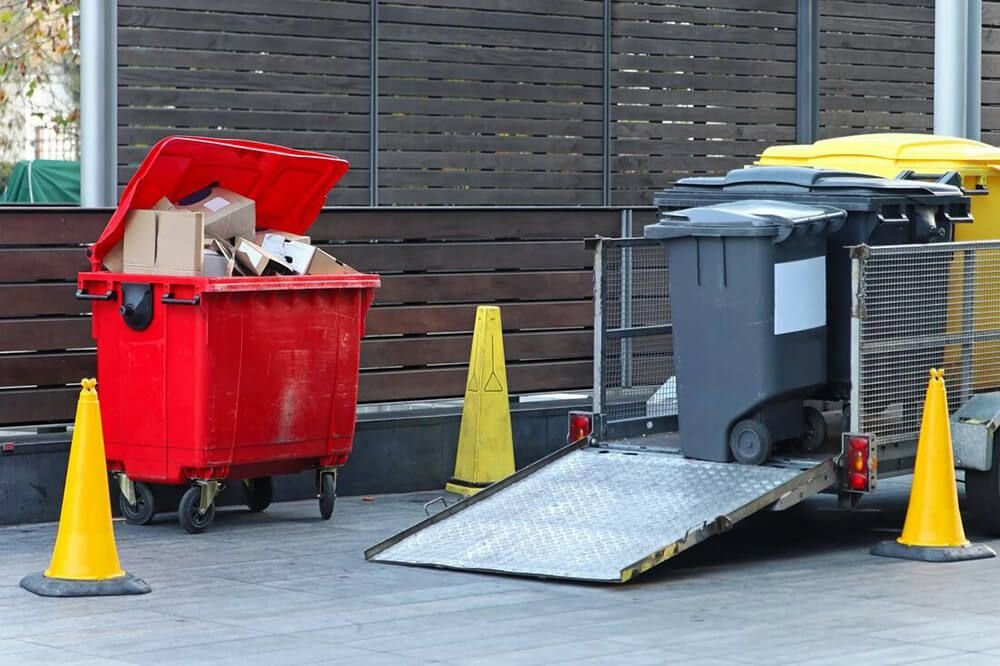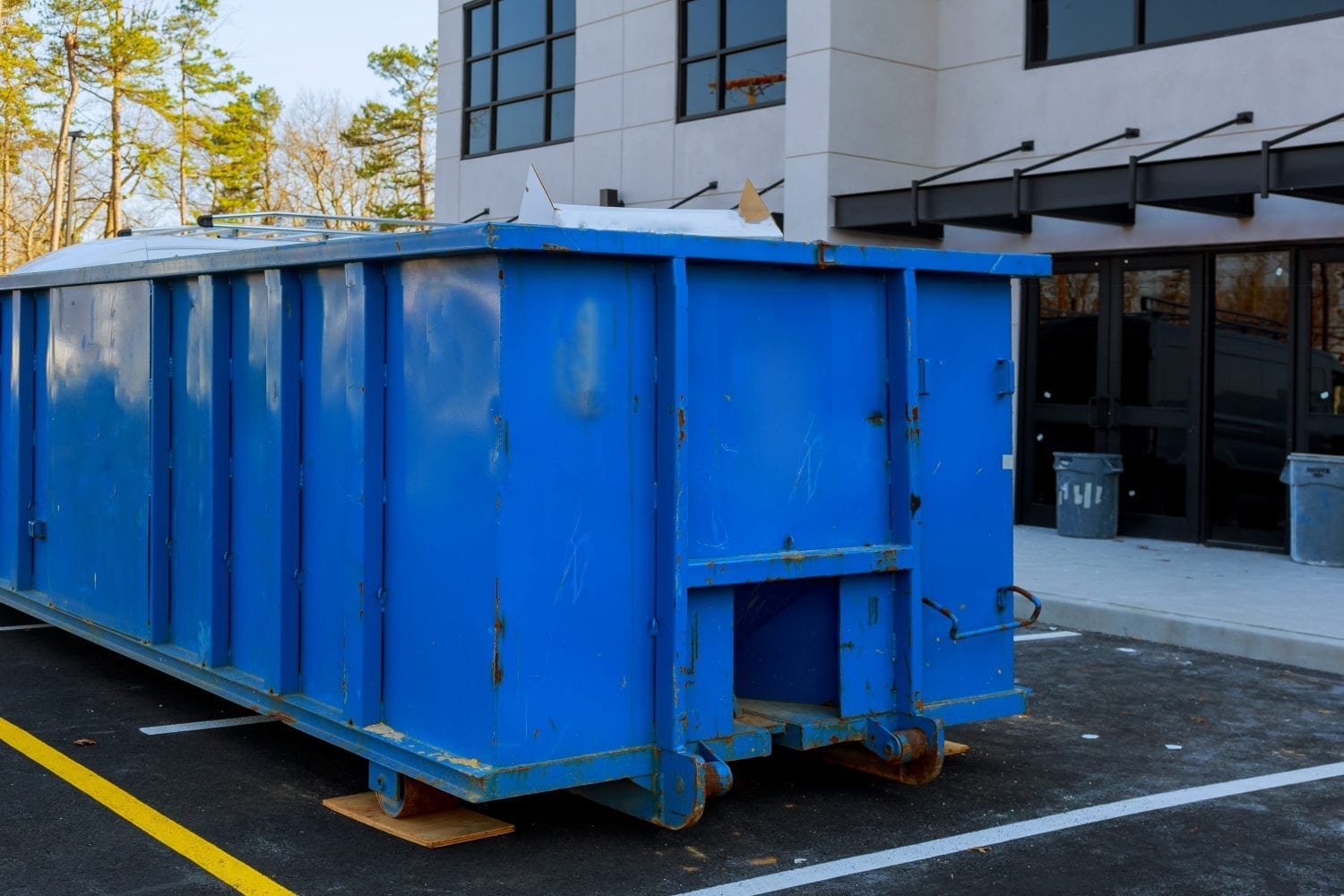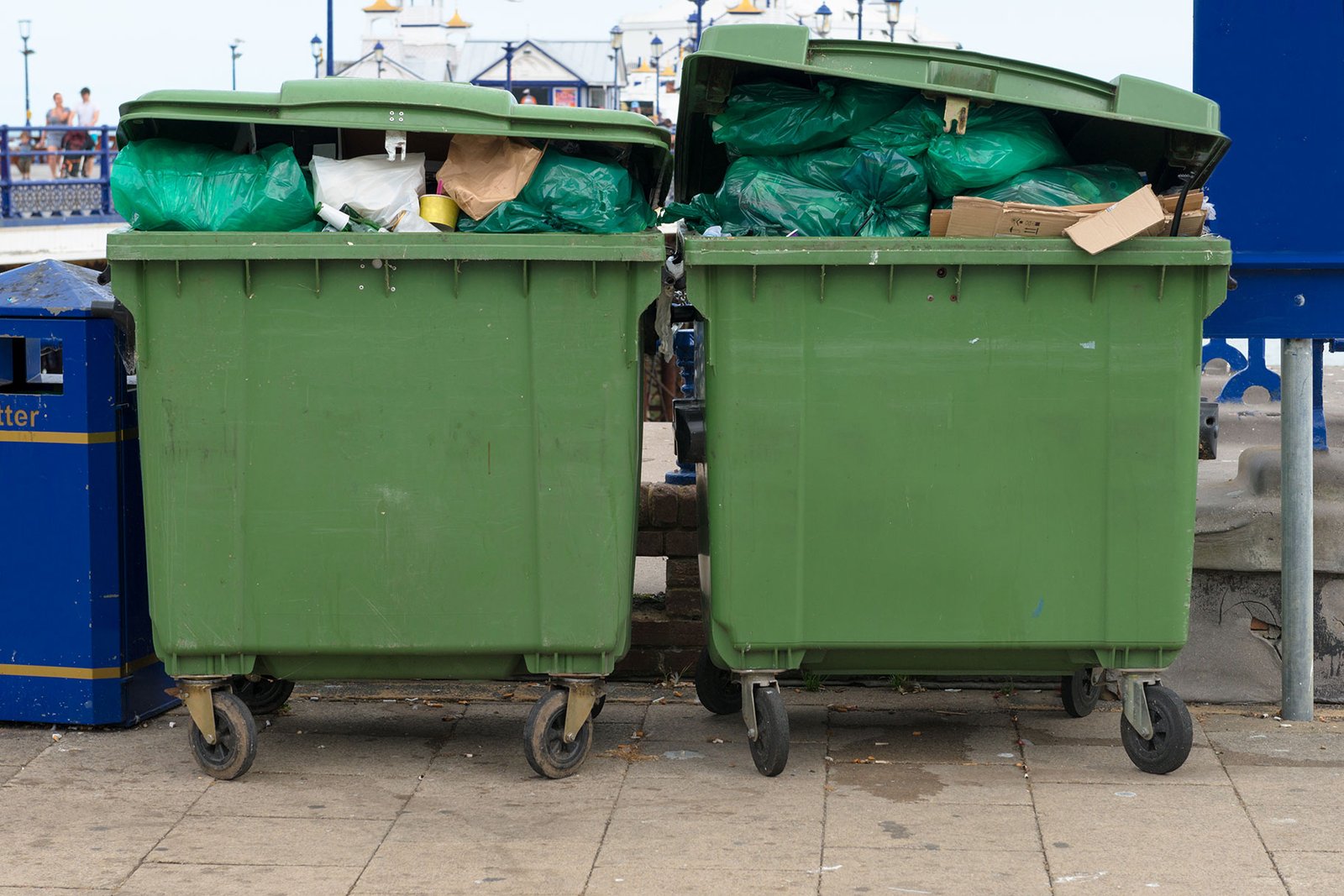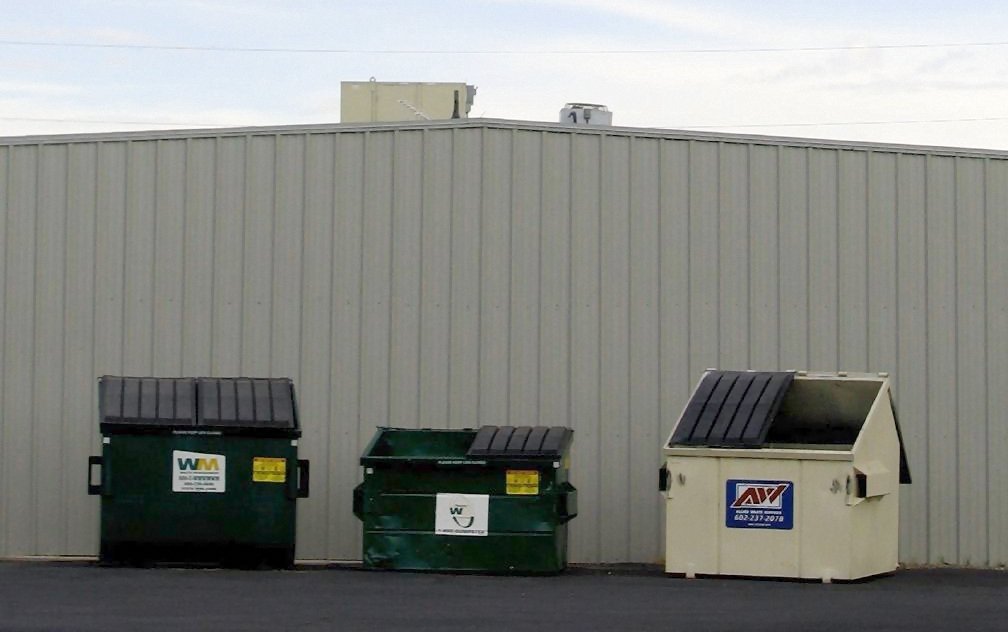Batteries, known for their ability to store and release electrical energy, have become an indispensable part of our modern lives. From powering our smartphones to propelling electric vehicles, batteries play a crucial role in various aspects of technology. However, when it comes to disposing of batteries, caution must be exercised due to the potential hazards they pose. This article aims to shed light on the significance of proper battery disposal by focusing on the specific case study of dumpster rentals in Miami FL.
In one hypothetical scenario, imagine a residential neighborhood where multiple households dispose of old electronic devices containing lithium-ion batteries into dumpsters without considering the environmental consequences. These discarded batteries could potentially come into contact with other waste materials or even ignite spontaneously under certain conditions, posing risks such as fires and toxic fumes. Dumpster rental companies in Miami FL are well aware of these dangers and strictly prohibit the inclusion of batteries in their containers. By exploring the reasons behind this prohibition and understanding how improper battery disposal can impact both human health and the environment, individuals will be encouraged to adopt responsible practices when dealing with used batteries.
Definition of batteries
Definition of Batteries
Imagine a bustling neighborhood in Miami where residents are diligently sorting through their waste, separating recyclables from non-recyclables. Among the discarded items, batteries stand out as potentially hazardous materials that require special attention. In this section, we will explore the definition of batteries and highlight why they should be handled responsibly.
Batteries are portable devices designed to store and release electrical energy on demand. They come in various shapes and sizes, ranging from small button cells used in watches to larger rechargeable batteries found in smartphones and electric vehicles. These power sources play a vital role in our daily lives by enabling countless electronic gadgets to function efficiently.
However, despite their usefulness, batteries can pose significant risks if not managed properly. To emphasize the importance of responsible disposal, consider the following bullet points:
- Chemical leakage: When batteries break or corrode over time, harmful chemicals such as lead acid or lithium compounds may leak into the environment.
- Contamination: The toxic substances within batteries can contaminate soil and water resources when dumped improperly.
- Fire hazards: Certain types of batteries have been known to ignite fires when disposed of incorrectly or damaged during transportation.
- Health concerns: Direct exposure to battery components can harm human health, leading to respiratory problems, skin irritations, or other ailments.
To further illustrate these dangers associated with mishandling batteries, let us take a closer look at the potential environmental impact through a table:
| Environmental Hazards | Effects |
|---|---|
| Soil Contamination | Reduced fertility and inhibits plant growth |
| Water Pollution | Adversely affects aquatic life |
| Air Pollution | Releases toxic fumes upon incineration |
In light of these compelling reasons for responsible battery disposal practices outlined above, it becomes evident that taking appropriate measures is essential for safeguarding both public health and the environment.
Transitioning seamlessly into the subsequent section on the “Environmental Hazards of Batteries,” it is crucial to recognize and understand how these potential risks can manifest in real-world scenarios.
Environmental hazards of batteries
Environmental Hazards of Batteries
Batteries, despite their convenience and widespread use in our modern society, pose significant environmental hazards when improperly disposed of. To illustrate the potential consequences, let us consider a hypothetical scenario: A residential dumpster rental company in Miami FL unknowingly accepts batteries as part of their waste collection service. These discarded batteries end up mixed with other trash items and eventually find their way to landfills or incineration facilities. This improper disposal method can have severe repercussions on both human health and the environment.
The hazardous nature of batteries stems from the toxic materials they contain. Many types of batteries consist of heavy metals such as lead, mercury, cadmium, and lithium. When these chemicals leach into soil or water sources from landfill sites or incinerators, they contaminate ecosystems and pose a threat to wildlife populations. For instance, studies have shown that even low levels of exposure to lead can negatively impact brain function in children and adults alike.
In addition to the direct harm posed by battery chemicals, their improper disposal also contributes to air pollution through incineration processes. Burning batteries releases harmful gases like sulfur dioxide and nitrogen oxide into the atmosphere, contributing to acid rain formation and respiratory issues for individuals living near these facilities. The accumulation of such pollutants over time further exacerbates climate change effects.
- Soil contamination leading to reduced crop yields
- Water pollution affecting aquatic life and drinking water sources
- Air pollution causing smog formation and respiratory illnesses
- Negative impact on biodiversity due to habitat destruction
Furthermore, take a moment to reflect upon this table illustrating some key statistics related to battery disposal:
| Environmental Hazard | Impact | Consequence |
|---|---|---|
| Soil Contamination | Reduced crop yields | Food scarcity |
| Water Pollution | Aquatic life and drinking water | Ecosystem imbalance |
| Air Pollution | Smog formation | Respiratory illnesses |
| Biodiversity Destruction | Habitat destruction | Loss of species diversity |
In summary, the improper disposal of batteries poses significant environmental hazards. To mitigate these risks, it is crucial to adhere to proper battery recycling practices. In the subsequent section on “Legal regulations on battery disposal in Miami FL,” we will explore the steps taken by local authorities to address this issue.
Legal regulations on battery disposal in Miami FL
Having discussed the environmental hazards associated with batteries, it is imperative to understand the legal regulations surrounding their disposal in Miami, Florida. Failure to adhere to these regulations can result in significant fines and penalties. This section will explore the specific guidelines imposed by local authorities regarding battery disposal.
Legal regulations on battery disposal in Miami FL:
To illustrate the importance of following proper procedures, let us consider a hypothetical scenario involving a residential neighborhood where several residents dispose of used batteries improperly. Over time, toxic elements seep into the soil and groundwater, polluting nearby ecosystems. The negative effects are evident as wildlife begins to exhibit signs of contamination and water sources become unsafe for consumption.
The City of Miami has implemented strict guidelines that prohibit dumping batteries into dumpsters or regular trash bins due to their potential harm to both human health and the environment. Below are four key points highlighting the legal requirements for appropriate battery disposal:
- Battery recycling programs: Local authorities strongly encourage residents to participate in community-led initiatives aimed at promoting responsible battery recycling.
- Drop-off centers: Numerous designated drop-off locations throughout Miami provide convenient options for individuals looking to safely dispose of their used batteries.
- Retailer participation: Many retailers offer collection boxes within their stores where customers can deposit old batteries for proper recycling.
- Hazardous waste facilities: For larger quantities or non-traditional battery types (e.g., car batteries), hazardous waste facilities are equipped to handle safe disposal.
Table – Environmental Impact Comparison:
| Method | Environmental Impact |
|---|---|
| Improper | Soil & groundwater pollution |
| Disposal | Wildlife contamination |
| Unsafe water sources | |
| Proper | Minimizes soil & water pollution |
| Disposal | Protects wildlife |
| Ensures safe water sources |
It is essential to recognize that adhering to these regulations not only helps protect the environment but also contributes to a healthier and safer community for all residents. By responsibly disposing of batteries, we can collectively reduce pollution and minimize the potential risks associated with hazardous materials.
Understanding the legal requirements regarding battery disposal lays the foundation for exploring alternative options for recycling batteries in Miami FL. Let us now delve into various methods available to individuals seeking sustainable solutions for their used batteries.
Alternative options for battery recycling
Case Study: John, a resident of Miami, recently rented a dumpster for a home renovation project. As he was getting ready to dispose of various materials, including batteries, he realized that batteries were prohibited items for dumpster rental in Miami FL. This left him wondering about the legal regulations surrounding battery disposal in the city.
In order to address this concern, it is important to understand the reasons behind these regulations and what alternative options are available for battery recycling. Firstly, disposing of batteries in dumpsters can have harmful consequences for both human health and the environment. Batteries contain toxic substances such as lead, mercury, and cadmium that can leak into soil and water sources when not properly disposed of. These pollutants pose serious risks to aquatic ecosystems and can contaminate drinking water supplies.
To encourage responsible battery disposal, here are some key points regarding the legal regulations in Miami FL:
- Battery recycling programs: The city provides designated drop-off locations where residents can safely recycle their batteries.
- Retailer responsibility: Some retailers who sell batteries may also have collection programs or partnerships with recycling facilities.
- Electronic waste events: Periodically, local authorities organize electronic waste events where residents can bring their old electronics and batteries for proper disposal.
- Hazardous waste facilities: Dedicated hazardous waste facilities exist where individuals can safely dispose of their household batteries.
By adhering to these regulations and utilizing alternative options for battery recycling, we can ensure the protection of our environment and prevent potential harm caused by improper disposal techniques.
Moving forward to the next section about “Consequences of improper battery disposal,” it is crucial to be aware of the negative impacts associated with irresponsible handling of batteries. Understanding these repercussions will further emphasize the importance of following proper procedures when dealing with used or expired batteries.
Consequences of improper battery disposal
Having explored alternative options for battery recycling, it is crucial to understand the potential consequences associated with improper battery disposal. A single instance of negligent handling can have far-reaching effects on both human health and the environment. Let us consider a hypothetical scenario to illustrate these risks more vividly.
Imagine an individual discarding their used batteries into a regular dumpster, unaware of the harmful implications. These batteries end up in a landfill where they start corroding over time, leaking dangerous chemicals such as lead, mercury, and cadmium into the surrounding soil. Rainwater washes these contaminants down into nearby water bodies, posing significant threats to aquatic life and potentially finding its way back into our drinking water supply.
To emphasize the gravity of this issue further, here are some key points that highlight the adverse effects of improper battery disposal:
- Battery acid leakage can contaminate soil and groundwater sources.
- Heavy metals present in batteries can accumulate in plant tissues and enter the food chain.
- Improper incineration of batteries releases toxic fumes into the atmosphere.
- Leaking batteries pose fire hazards when disposed alongside combustible materials.
Consider this table illustrating the environmental impact caused by improper battery disposal:
| Environmental Impact | Description | Potential Consequence |
|---|---|---|
| Soil Contamination | Battery acids seep through soil | Reduced fertility |
| Water Pollution | Chemicals leach into water bodies | Harmful to aquatic life |
| Air Pollution | Toxic fumes released during incineration | Adverse respiratory effects |
| Fire Hazards | Battery leaks combined with combustible items | Increased risk of fires |
In light of these alarming consequences, it is imperative to adopt proper methods for disposing of batteries in Miami FL. By doing so, we can minimize the potential harm caused by battery disposal and contribute to a healthier environment.
With an understanding of the risks involved in improper battery disposal, let us now explore effective methods for safely managing and disposing of batteries in Miami FL.
Proper methods for disposing of batteries in Miami FL
Consequences of improper battery disposal can have severe impacts on the environment and human health. Now, let’s explore proper methods for disposing of batteries in Miami FL to ensure a safe and eco-friendly approach.
One example that highlights the importance of responsible battery disposal is the case of a local landfill in Miami. Due to an individual improperly disposing of a large quantity of batteries, hazardous materials leaked into the surrounding soil and groundwater. This contamination not only posed risks to nearby ecosystems but also threatened the quality of drinking water sources for local residents.
To avoid such detrimental outcomes, it is crucial to be aware of how to properly dispose of batteries in Miami FL. Consider the following guidelines:
-
Recycling centers: Research reputable recycling centers or facilities that accept batteries for proper recycling. These facilities are equipped with appropriate techniques and technologies to handle different types of batteries safely.
-
Retailer programs: Many electronic retailers offer take-back programs where customers can return used batteries free-of-charge. Utilizing these programs ensures that batteries will be disposed of correctly by professionals who understand their potential hazards.
-
Hazardous waste collection events: Keep an eye out for community-sponsored events focused on collecting hazardous waste, including batteries. These events often provide convenient drop-off locations and expert guidance on environmentally friendly disposal methods.
-
Household hazardous waste management: Familiarize yourself with your local government’s guidelines regarding household hazardous waste collections or pick-up services specifically designed for items like batteries.
By adopting these practices, you contribute towards safeguarding our ecosystem from harmful battery-related pollution while promoting sustainable waste management principles.
Now, let’s examine a table illustrating the environmental impact caused by improper battery disposal versus responsible battery recycling:
| Improper Battery Disposal | Responsible Battery Recycling |
|---|---|
| Leaching toxic chemicals into soil and water bodies | Proper treatment and containment measures prevent leaching |
| Contaminating natural habitats | Preserving biodiversity through eco-friendly recycling processes |
| Releasing hazardous substances into the air when incinerated | Minimizing air pollution through controlled and regulated recycling methods |
| Endangering human health through exposure to toxic materials | Protecting public well-being by reducing potential risks associated with improper battery disposal |
By contrasting these two approaches, it becomes evident that responsible battery recycling is a crucial step in mitigating environmental damage and promoting sustainability.
In summary, proper disposal of batteries in Miami FL requires individuals to be proactive and informed. By adhering to guidelines provided by local authorities, utilizing retailer programs, and participating in community-sponsored events focused on hazardous waste collection, we can collectively contribute towards preserving our environment for future generations.







